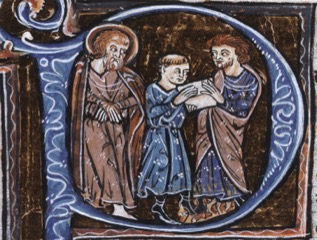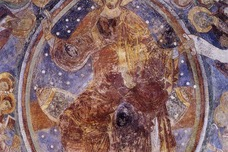Sunday Reflection with Canon Robin Gibbons: 7th September 2025

Onesimus and Philemon
23rd Sunday in Ordinary Time
1. The story of Onesimus
I like the story of Onesimus, touched on in the second reading. Rather like the meaning of his name in English, translated from the Greek as useful or profitable, his small tale of conversion, forgiveness, and salvation is 'profitable for our souls' and although we may not be slaves in same way he once was, I am sure we can look to his story and discern in ourselves something that we need to be freed from.
Onesimus was a runaway 'slave' of a wealthy Christian friend of Paul's called Philemon. Whilst in Rome Onesimus came into contact with Paul in prison, this is explicitly pointed out by Paul early on in this letter when an allusion is made to this deep friendship between them: "I appeal to you for my son Onesimus, who became my son while I was in chains ( or imprisonment)" (Philemon 1:10).
Onesimus himself converted to Christianity whilst in Rome, and at some point Paul seems to have encouraged Onesimus to return to Philemon but not as a slave, for this letter is a plea to reconcile the two not as master and servant but as brothers. This is the context of the second reading today, a direct appeal to Philemon! We can sense it in the intensity of Paul's own words built around that friendship we find mentioned in verse 10: "I am sending him, that is, my own heart, back to you.I should have liked to retain him for myself, so that he might serve* me on your behalf in my imprisonment for the gospel, but I did not want to do anything without your consent, so that the good you do might not be forced but voluntary.".(Philemon 1: 12-14)
2. The grace and love of God at work in life.
Scripture scholars accept the letter as genuine and written by Paul, the fact that it was preserved and included in the Canon of NT scripture also indicates that Paul's plea for Onesimus was a successful, one but it also shows the emerging understanding that slavery was not consistent with being a baptised Christian in the Church. The reference Paul makes in this section is to an evolution of Christ's grace in the life of Onesimus as well as Paul and Philemon. That gracious and voluntary act of gifting freedom by Philemon to Onesimus, but also the wider context of Onesimus' own conversion and willingness to reconcile and be reconciled with Philemon.
In this sense it is a real demonstration of the way that early Christian community understood their vocation as disciples of the Lord, living out the commandment of love and also forgiveness in the context of daily life. Paul himself sees the journey of Onesimus as one of faith which will have good consequences:' Perhaps this is why he was away from* you for a while, that you might have him back forever,no longer as a slave but more than a slave, a brother, beloved especially to me, but even more so to you, as a man* and in the Lord.( Philemon 1:15,16)
Apart from the letter to Philemon, the only other mention of him in Scripture is found in Paul's epistle to the Colossians, where he is called "a faithful and beloved brother" a reflection of the high esteem Paul has for him as an adopted son in the faith, something that has perhaps a level of security for Onesimus as a slave under Roman rule and subject to the penalties of Roman Law as well as that of equality in friendship. In any event Paul seems to have succeeded in getting Philemon both to free him and accept him as a brother in Christ:
"All my state shall Tychicus declare unto you, who is a beloved brother, and a faithful minister and fellow servant in the Lord: Whom I have sent unto you for the same purpose, that he might know your estate, and comfort your hearts; With Onesimus, a faithful and beloved brother, who is one of you. They shall make known unto you all things which are done here. (Colossians 4:7-9)
3. Wider connections
There is something too in the meaning of their names that gives a poignancy to this story, Onesimus the 'useful' one, particularly useful for us as we reflect on his story, of the continual ability Christ hands to us in situations where forgiveness and acceptance of each other bring about greater good. Paul himself stands surety for any money Onesimus owes Philemon, much as we are asked to go the extra mile for others, giving to those in need. But it is also there in the figure of Philemon, whose name means kind, loving or affectionate, and whose gesture of acceptance reflects this charism. The story doesn't end there, for in later tradition of Church history Onesimus becomes a bishop in Ephesus and is martyred under Trajan, whilst Philemon becomes a bishop in Gaza! A reminder of the importance of that region for the story of early Christianity and also why we should be far more involved in standing up for those oppressed there.
Whilst I have spent some time looking at the story of Onesimus, the lesson of journey, adaptation, forgiveness reconciliation and change also appears in todays first and Gospel readings as well. In the book of Wisdom we are reminded that as people of faith we depend on the help of the Lord to understand and interpret issues with us, for as the writer reminds us: "Or who can know your counsel, unless you give Wisdom and send your holy spirit from on high?" ( Wisdom 2: 17)
Like Paul we are to look beyond the immediate to see that extra something that makes each event an encounter with Christ, we must ask for the grace of Holy Wisdom to enable us to be faithful to our calling. In the gospel that seemingly hard command to reject core relationships for the sake of Christ, or to respond to these words: "Whoever does not carry his own cross and come after me cannot be my disciple"(Luke 14:27)) does not mean isolation or disconnection from those we hold dear, it means transformation and change, adapting to a life now lived in, with and through Christ. possessions we have, but it is how we use them, whether the meaning they have in our lives dominates all else, thus preventing us from that generosity of spirit which sees all we are given as a gift touched by God and in the end belonging to God. Perhaps we can take heart from Onesimus and Philemon in taking on their charism of being useful in the service of the `lord with a kind manner towards others, doing things with am affectionate and loving heart!
Lectio
Martyrology of Onesimus from the Orthodox Church
Onesimus, Apostle of the Seventy in his youth was a servant of Philemon, a Christian of distinguished lineage, living in the city of Colossae, Phrygia. Guilty of an offense against his master and fearing punishment, Onesimus fled to Rome, but as a runaway slave he wound up in prison. In prison he encountered the Apostle Paul, was enlightened by him, and was baptized.
In prison Onesimus served the Apostle Paul like a son. Paul was personally acquainted with Philemon, and wrote him a letter filled, asking him to forgive the runaway slave and to accept him like a brother. He sent Onesimus with this letter to his master, depriving himself of help, of which he was in need.
After he received the letter, Philemon not only forgave Onesimus, but also sent him back to Rome to the apostle. Philemon (January 4, February 19, and November 22) was afterwards consecrated bishop of the city of Gaza.
After the death of the Apostle Paul, Onesimus served the apostles until their end, and he was made a bishop. After the death of the holy apostles he preached the Gospel in many lands and cities: in Spain, Carpetania, Colossae, Patras.
In his old age, Onesimus was bishop at Ephesus, after the Apostle Timothy. When they took Ignatius the God-Bearer (December 20) to Rome for execution, Bishop Onesimus came to meet with him with other Christians, as Ignatius mentions in his Epistle to the Ephesians.
During the reign of the emperor Trajan (89-117), Onesimus was arrested and brought to trial before the eparch Tertillus. He was held in prison for eighteen days, and then sent him to prison in the city of Puteoli. After a time, the eparch sent for the prisoner and, convincing himself that Onesimus maintained his faith in Christ, had him stoned, after which they beheaded him with a sword. A certain illustrious woman took the body of the martyr and placed it in a silver coffin. This took place in the year 109.
Prayer to God - St Ambrose of Milan (337-397 AD)
O Lord, who has mercy upon all, take away from me my sins,
and mercifully kindle in me the fire of Your Holy Spirit.
Take away from me the heart of stone,
and give me a heart of flesh,
a heart to love and adore You,
a heart to delight in You,
to follow and to enjoy You,
for Christ's sake.


















